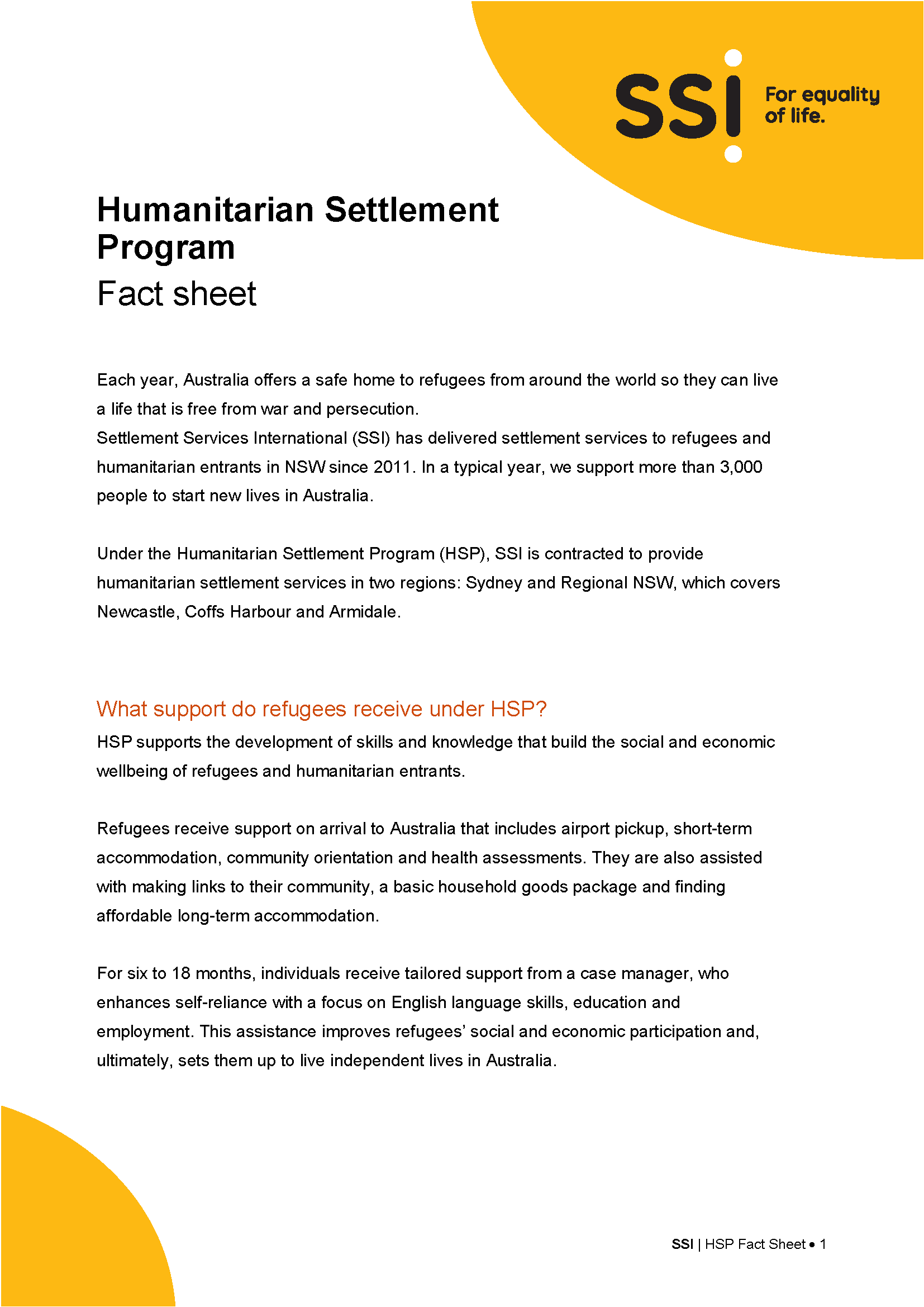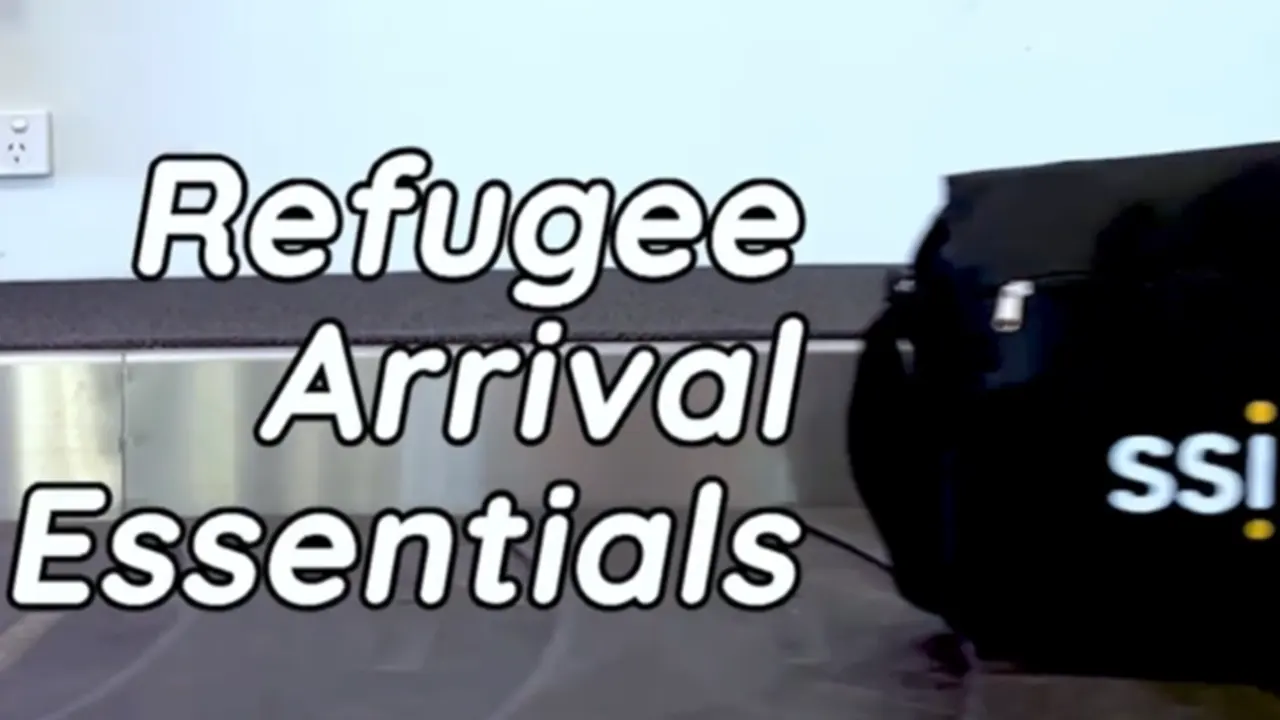About the program
A safe, welcoming introduction is the first step to building a strong future.
SSI is contracted by the Department of Home Affairs to deliver the Humanitarian Settlement Program (HSP) in metropolitan Sydney and in the NSW regional centres of Armidale and Coffs Harbour.
The HSP supports humanitarian entrants and other eligible visa holders to integrate into Australian life. It does this by helping new arrivals build the skills and knowledge they need to become self-reliant and active members of the community.
The program has a strong focus on helping clients to learn English, gain employment and access education and training. SSI delivers support to clients using an individualised case management approach tailored to their needs, strengths and goals.
As a trusted delivery partner, SSI draws on decades of expertise in settlement and inclusion to deliver HSP services across NSW. We work with community and other partners to provide a spectrum of support that helps individuals and families successfully settle and thrive in Australia.
How we help



Our impact
9,918
refugees
supported.
99
percent
of participants reported they felt welcomed.
97
percent
of participants improved their understanding of support services available to them.
FY24
About our refugee support services:
From the very first day, we make sure newcomers feel safe and welcome. Our bilingual staff greet families at the airport with words of welcome in their own language, provide an essentials bag, arrange accommodation, and help ensure documentation like Medicare cards are in place.
HSP aims to assist and empower newcomers to gain independence in their new communities. The HSP team proactively looks for opportunities to link newly arrived community members with skills recognition courses to help them get the best start to life in Australia. SSI also offers internal job readiness programs to teach new arrivals about the local employment market and help them prepare to enter the workforce. Our Refugee Employment Support Program also supports refugees to find suitable and skilled employment opportunities.
HSP case managers ensure that learning English is a top priority for all new arrivals by connecting refugees with age-appropriate learning support, such as ESL classes and NAVITAS lessons. Staff members speak more than 80 dialects, so there is a strong focus on in-language support, which sets the foundation for solid relationships between case managers and refugees.
All HSP staff receive specialist training enabling them to keep young people motivated and energised when they are at their most vulnerable in the early stages of settlement. Along with a tailored information guide and regular youth activities, SSI offers youth orientation sessions that cover important issues for young people such as health, tenancy rights and obligations, and money management.
Supporting vulnerable women to connect with their peers and develop lasting meaningful connections helps to reduce the risk of isolation and anxiety during the early stage of settlement. SSI has a unique Women at Risk service model that includes support from specialised case managers, bilingual guides and mentors; tailored orientation sessions; social groups; and innovative initiatives such as employment workshops and partnerships with external information providers.
SSI’s HSP services focus on the whole needs of the person – including health and wellbeing. As well as offering initial health assessments upon arrival, SSI offers many programs designed to meet new arrivals’ specific health needs in partnership with refugee health services.
Beyond traditional education and employment avenues, we champion creative activities as a powerful pathway to connection, self-expression, and healing. We pioneered our unique Creative Compass initiative to support artistic practice as an avenue for newcomer’s economic, art and cultural participation.
By fostering engagement, we help newcomers navigate everyday life and establish connections that enrich both their lives and the broader community. Excursions to cultural sites, sports, beach safety sessions, and immersive events foster integration, confidence, and belonging.
More about HSP
Our culturally and linguistically diverse workforce ensures the first words that new arrivals hear are ‘welcome to Australia’ in their preferred language.”
Migrant and refugee FAQs
A migrant is a person who makes a conscious choice to leave their country to seek a better life. They can plan their travel, take their belongings with them and say goodbye to the important people in their lives. They are free to return home at any time if things don’t work out or if they get homesick. Refugees are forced to leave their country due to war or persecution. They leave behind their homes, most or all of their belongings, and their family members and friends. They cannot return unless the situation that forced them to leave improves.
An asylum seeker is a person who has sought protection as a refugee, but whose claim for refugee status has not yet been assessed. Every refugee has at some point been an asylum seeker. Those asylum seekers who are found to be refugees are entitled to international protection and assistance. Refugees who have come to Australia by boat or plane seeking asylum are usually placed on protection visas that entitle them to different support than refugees who come to Australia as part of the offshore humanitarian program.
Refugees make important social contributions to their new communities, including offsetting ageing populations and reviving regional schools. There is also an economic benefit to resettling refugees in regional communities due to the related population growth. In the Victorian town of Nhill, for example, the net monetary gain of resettling 160 refugees over a five-year period exceeded $41 million. (The Guardian)
The arrival of refugees actually create jobs. The more a town or city’s population grows, the more services and businesses are required to meet its expanding needs, which leads to job creation. Refugees come from all walks of life — they’re farmers, teachers, bakers and tradespeople. They have skills and experience that can be of great value to the community.
Everyone who comes to Australia as a refugee must pass a series of rigorous health, character and security checks before being granted a visa. These are just regular people who, through no fault of their own, have been forced to leave behind their homes and everything they know in search of safety.
SSI provides settlement support to refugees. This includes airport pick-ups, short-term accommodation, health assessments, linkages to education, English and employment support providers, and orientation to the local community. Refugees are also encouraged to take part in a range of social and community engagement activities to help them integrate into the community. By supporting refugees through the early days in Australia, SSI aims to improve their social and economic participation and, ultimately, sets refugees up to live independent lives in Australia.
SSI works hand-in-hand with the community and local organisations to help refugees to settle. Continued support from the community is critical to ensuring refugees feel at home. This support can take many forms. It might be volunteering with SSI, offering a friendly smile at the supermarket, or holding an event to welcome refugees to their new home.
At SSI, we recognise the critical role the community plays in successful settlement. Community groups who want to learn more about refugees and extend a gesture of welcome, such as a picnic or an excursion to a favourite local site, are encouraged. To ensure these activities are meaningful and suitable for newcomers, please check-in with us.
Community members are also encouraged to get involved with refugee resettlement by volunteering with SSI. Our volunteers:
* Provide social support
* Help with English practice
* Assist with events and excursions
* Provide employment mentoring
* Create social connections
* And much more!
To get involved, please check out volunteering opportunities at SSI.
HSP resources

Learn more about SSI’s HSP program
Get in touch
NSW
SSI delivers HSP services to newcomers in metropolitan Sydney and in the NSW regional centres of Armidale and Coffs Harbour. To learn more about these programs, please contact the relevant HSP NSW office.
Sydney (Parramatta)
19/60 Station Street East, Parramatta NSW 2150,
P: 02 9685 0100
Newcastle
Level 3, 3 Hopetoun Street, Charlestown, NSW 2290
P: 02 4969 3399
Coffs Harbour
Suite 6, 1 Duke Street, Coffs Harbour, NSW 2450
P: 0470 337 788
Armidale
1/86 Beardy Street, Armidale NSW 2350
P: 02 9057 5673



